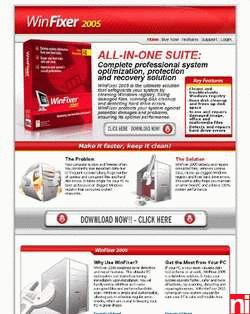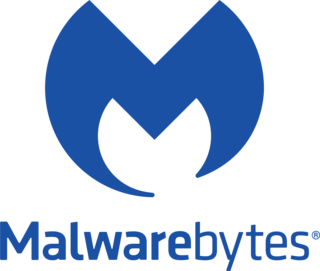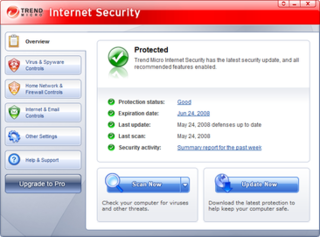Related Research Articles
Malware is any software intentionally designed to cause disruption to a computer, server, client, or computer network, leak private information, gain unauthorized access to information or systems, deprive access to information, or which unknowingly interferes with the user's computer security and privacy. Researchers tend to classify malware into one or more sub-types.
Spyware is any software with malicious behavior that aims to gather information about a person or organization and send it to another entity in a way that harms the user by violating their privacy, endangering their device's security, or other means. This behavior may be present in malware and in legitimate software. Websites may engage in spyware behaviors like web tracking. Hardware devices may also be affected.

Antivirus software, also known as anti-malware, is a computer program used to prevent, detect, and remove malware.

Spybot – Search & Destroy (S&D) is a spyware and adware removal computer program compatible with Microsoft Windows. Dating back to the first Adwares in 2000, Spybot scans the computer hard disk and/or RAM for malicious software.

Scareware is a form of malware which uses social engineering to cause shock, anxiety, or the perception of a threat in order to manipulate users into buying unwanted software. Scareware is part of a class of malicious software that includes rogue security software, ransomware and other scam software that tricks users into believing their computer is infected with a virus, then suggests that they download and pay for fake antivirus software to remove it. Usually the virus is fictional and the software is non-functional or malware itself. According to the Anti-Phishing Working Group, the number of scareware packages in circulation rose from 2,850 to 9,287 in the second half of 2008. In the first half of 2009, the APWG identified a 585% increase in scareware programs.
Norton AntiVirus is an anti-virus or anti-malware software product founded by Peter Norton, developed and distributed by Symantec since 1990 as part of its Norton family of computer security products. It uses signatures and heuristics to identify viruses. Other features included in it are e-mail spam filtering and phishing protection.

WinFixer was a family of scareware rogue security programs developed by Winsoftware which claimed to repair computer system problems on Microsoft Windows computers if a user purchased the full version of the software. The software was mainly installed without the user's consent. McAfee claimed that "the primary function of the free version appears to be to alarm the user into paying for registration, at least partially based on false or erroneous detections." The program prompted the user to purchase a paid copy of the program.

AntiVirus Gold is rogue software developed by ICommerce Solutions S.A. that poses as a legitimate antivirus program. It attempts to persuade users to buy the software by displaying ads and other nagware. It is believed that the name of the program is an attempt at social engineering to confuse people about the legitimate program AVG Anti-Virus.

Adaware, formerly known as Lavasoft, is a software development company that produces spyware and malware detection software, including Adaware. It operates as a subsidiary of Avanquest, a division of Claranova.
The Vundo Trojan is either a Trojan horse or a computer worm that is known to cause popups and advertising for rogue antispyware programs, and sporadically other misbehavior including performance degradation and denial of service with some websites including Google and Facebook. It also is used to deliver other malware to its host computers. Later versions include rootkits and ransomware.
Rogue security software is a form of malicious software and internet fraud that misleads users into believing there is a virus on their computer and aims to convince them to pay for a fake malware removal tool that actually installs malware on their computer. It is a form of scareware that manipulates users through fear, and a form of ransomware. Rogue security software has been a serious security threat in desktop computing since 2008. An early example that gained infamy was SpySheriff and its clones, such as Nava Shield.

SpySheriff is malware that disguises itself as anti-spyware software. It attempts to mislead the user with false security alerts, threatening them into buying the program. Like other rogue antiviruses, after producing a list of false threats, it prompts the user to pay to remove them. The software is particularly difficult to remove, since it nests its components in System Restore folders, and also blocks some system management tools. However, SpySheriff can be removed by an experienced user, antivirus software, or by using a rescue disk.

Kaspersky Anti-Virus is a proprietary antivirus program developed by Kaspersky Lab. It is designed to protect users from malware and is primarily designed for computers running Microsoft Windows and macOS, although a version for Linux is available for business consumers.
The Zlob Trojan, identified by some antiviruses as Trojan.Zlob, is a Trojan horse which masquerades as a required video codec in the form of ActiveX. It was first detected in late 2005, but only started gaining attention in mid-2006.

Bitdefender is a Romanian cybersecurity technology company headquartered in Bucharest, Romania, with offices in the United States, Europe, Australia and the Middle East.
Ultimate Defender is a rogue antivirus program published by Nous-Tech Solutions Ltd. The program is considered malware due to its difficult uninstallation and deceptive operation. It is commonly installed by the Vundo trojan.

Malwarebytes is anti-malware software for Microsoft Windows, macOS, ChromeOS, Android, and iOS that finds and removes malware. Made by Malwarebytes Corporation, it was first released in January 2006. This is available in a free version, which scans for and removes malware when started manually, and a paid version, which additionally provides scheduled scans, real-time protection and a flash-memory scanner.
Microsoft Security Essentials (MSE) is a discontinued antivirus software (AV) product that provides protection against different types of malicious software, such as computer viruses, spyware, rootkits, and Trojan horses. Prior to version 4.5, MSE ran on Windows XP, Windows Vista, and Windows 7, but not on Windows 8 and later versions, which have built-in AV components known as Windows Defender. MSE 4.5 and later versions do not run on Windows XP. The license agreement allows home users and small businesses to install and use the product free of charge.
MS Antivirus is a scareware rogue anti-virus which purports to remove virus infections found on a computer running Microsoft Windows. It attempts to scam the user into purchasing a "full version" of the software. The company and the individuals behind Bakasoftware operated under other different 'company' names, including Innovagest2000, Innovative Marketing Ukraine, Pandora Software, LocusSoftware, etc.

Trend Micro Internet Security is an antivirus and online security program developed by Trend Micro for the consumer market. According to NSS Lab comparative analysis of software products for this market in 2014, Trend Micro Internet Security was fastest in responding to new internet threats.
References
- ↑ "ByteDefender or Byte Defender Removal Guide".
- ↑ "Rogue Antispyware: Bytedefender Security 2010". 20 May 2010. Retrieved 2010-05-20.
- 1 2 3 4 "Uninstall ByteDefender - precisesecurity.com". Marco Mathew. 2010-05-20.
- ↑ "Remove ByteDefender Security 2010".